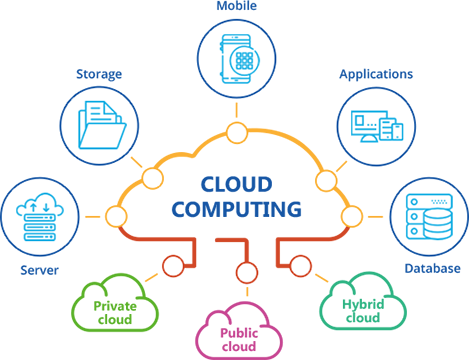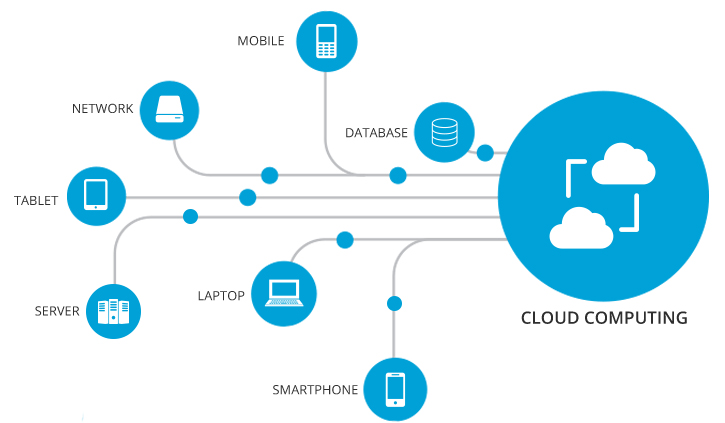Streamline IT Monitoring With Cloud Provider
In today's quickly developing electronic landscape, the function of IT administration is ending up being significantly complex. Organizations are constantly seeking means to streamline their IT operations to stay affordable and dexterous. Cloud services have become a viable solution for businesses looking to boost performance, minimize expenses, and improve total IT efficiency. By accepting cloud technology, firms can attain higher flexibility, scalability, and safety and security in handling their IT framework. However how specifically do these cloud solutions transform conventional IT monitoring techniques? Allow's discover the transformative effect of leveraging cloud services on IT procedures and the crucial considerations for successful implementation.
Benefits of Cloud Provider

Additionally, cloud services allow organizations to enhance their operational efficiency by simplifying processes and reducing the time and sources needed for managing IT infrastructure. With cloud solutions, organizations can automate regular jobs, such as software updates and data back-ups, releasing up IT groups to focus on more strategic initiatives that drive business worth.

Enhanced Scalability and Adaptability
Cloud solutions provide businesses with unparalleled scalability and flexibility in handling their IT resources effectively. Scalability is an important attribute of cloud services that allows business to easily readjust their IT resources based upon demand. With cloud solutions, companies can promptly scale up or down their computer resources, storage ability, and network bandwidth to meet changing requirements without the demand for substantial in advance financial investments in hardware. This adaptability enables organizations to adapt to rising and fall workloads, seasonal demands, or unforeseen development without experiencing downtime or efficiency issues.
Furthermore, cloud solutions supply the versatility for workers to accessibility company data and applications from anywhere, at any kind of time, and from any kind of tool with a web connection. This capacity improves performance and collaboration amongst remote teams or employees operating in various areas. In addition, cloud services give the versatility to pick from a variety of solution models, such as Facilities as a Solution (IaaS), System as a Solution (PaaS), or Software Program as a Solution (SaaS), based upon the certain needs of business. The boosted scalability and versatility used by cloud services equip companies to enhance their IT operations and stay dexterous in today's vibrant market setting.

Cost-Effectiveness and Savings
With the capability to effectively assign resources based upon demand, services utilizing cloud solutions can harness considerable cost-effectiveness and understand considerable savings in their IT procedures. Cloud solutions provide a pay-as-you-go design, permitting business to only spend for the resources they make use of, removing the need for read huge upfront financial investments in software and hardware. This scalability makes sure that services can easily adjust to rising and fall demands without spending beyond your means on unnecessary resources. Furthermore, cloud services lessen upkeep prices by shifting the obligation of equipment maintenance and software application updates to the provider. This reduces the requirement for specialized IT team to manage infrastructure, additional cutting down functional expenditures. Moreover, the cloud provides economic climates of range, with providers spreading expenses throughout several customers, causing reduced individual costs for services like storage space and computer power. In see here general, the cost-effectiveness and cost savings attained via cloud solutions make it possible for organizations to reallocate resources towards innovation and growth efforts.
Improved Security and Conformity
Enhancing the total protection position and making sure regulatory compliance are vital considerations for services leveraging cloud services in their IT monitoring methods. Cloud provider offer innovative safety and security actions, such as data security, multi-factor authentication, and automated backups, which can strengthen a business's protection framework. These carriers likewise stick to stringent regulative criteria, such as GDPR, HIPAA, and PCI DSS, helping services meet compliance demands better.
Carrying out cloud solutions can enhance safety by giving centralized control over gain access to monitoring, monitoring, and data security. This central strategy simplifies safety and security administration and makes certain regular application of safety and security plans throughout the organization. Cloud solutions often offer real-time safety and security updates and patches, minimizing the threat of susceptabilities and possible breaches.
Ideal Practices for Cloud Implementation
Implementing cloud services Related Site successfully requires a structured method that incorporates thorough planning and persistent execution. To make sure a smooth transition to the cloud, companies should start by conducting a detailed evaluation of their present IT facilities and identifying which workloads are suitable for movement. It is vital to develop clear goals and define essential performance indicators (KPIs) to gauge the success of the cloud execution.
Among the very best practices for cloud execution is to meticulously pick a cloud company that straightens with the organization's needs in terms of security, conformity, scalability, and cost-effectiveness. In addition, producing a detailed movement plan that details the steps entailed, timelines, and responsibilities is critical for a successful execution.
Frequently keeping track of and enhancing cloud sources to make sure efficient performance and price management is an additional essential facet of cloud execution ideal practices. Continuous examination of the cloud environment and staying notified concerning updates and new features used by the cloud provider can even more improve the company's cloud approach. By following these best methods, companies can simplify their IT monitoring and optimize the advantages of cloud solutions.
Verdict
Finally, leveraging cloud services for IT administration provides many advantages, consisting of improved scalability, cost-effectiveness, enhanced safety, and conformity. By adhering to ideal techniques for cloud execution, companies can simplify their IT procedures, automate regular jobs, and maximize resource allotment. This streamlined method enables IT teams to focus on calculated campaigns and innovation, ultimately providing value to the organization. In general, cloud services enhance operational efficiency and agility in managing IT infrastructure.
In addition, cloud solutions supply the versatility to select from a range of service versions, such as Framework as a Solution (IaaS), System as a Solution (PaaS), or Software Application as a Solution (SaaS), based on the certain requirements of the service. In addition, cloud solutions lessen maintenance costs by changing the duty of equipment upkeep and software updates to the solution supplier.Enhancing the general safety and security posture and ensuring governing conformity are extremely important considerations for businesses leveraging cloud solutions in their IT monitoring strategies.Routinely optimizing and monitoring cloud resources to make sure efficient efficiency and cost administration is another vital aspect of cloud execution ideal methods. Continuous analysis of the cloud atmosphere and remaining informed regarding updates and new features supplied by the cloud company can further improve the company's cloud approach.